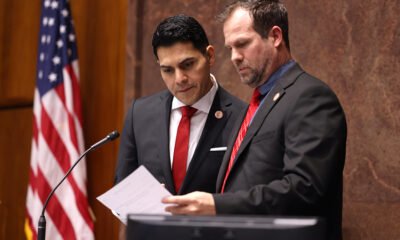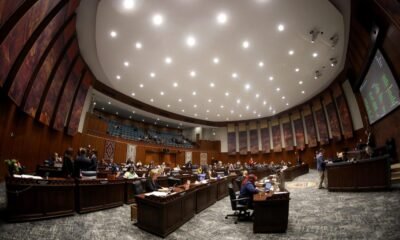abortion access
Doctors Urge Arizonans to Back Prop. 139 in Crucial Vote

As the November ballot approaches, health providers in Arizona are advocating for Proposition 139, a measure that aims to enshrine abortion access as a fundamental right in the state constitution. With less than two weeks until voters make a decision, medical professionals stress the importance of supporting this initiative.
During a recent virtual roundtable, Dr. Laura Mercer emphasized that Proposition 139 would empower patients and their healthcare providers to make crucial health decisions. “This measure guarantees the right to abortion and puts health care decisions where they belong,” she stated, reflecting a broader sentiment among advocates.
The Committee to Protect Health Care, which comprises over 20,000 doctors and advocates, has been pivotal in pushing for reproductive rights. In the summer, they circulated a letter signed by 550 Arizona-based medical professionals, solidifying support for the “Arizona Abortion Access Act.” If passed, the proposal would eliminate the existing 15-week gestational ban, allowing providers to perform abortions up until fetal viability, typically around 23 to 24 weeks, with additional provisions for the health of the mother.
Dr. Mercer, an experienced OB-GYN, argued against political interference in medical decisions. “Politicians should not dictate critical health care decisions for women,” she said, advocating for the agency of patients and their healthcare teams.
Despite criticism claiming that the measure could jeopardize safety standards, Mercer rejected such assertions. She outlined that Proposition 139 solely aims to secure the constitutional right to seek an abortion, without altering existing safety regulations.
Concerns persist about the potential role of other anti-abortion laws, including mandatory ultrasounds and waiting periods, which may impact access. However, modifying these laws would necessitate judicial intervention.
Family physician Patricia Lebensohn highlighted the plight of victims of rape and incest due to the current 15-week ban, which offers no recourse for women who become pregnant from such circumstances after this timeframe. “No one should be forced to carry their attacker’s child,” she stated, advocating for change.
Dr. Paul Isaacson, co-owner of a Valley abortion clinic, warned of the risks that the 15-week law poses, particularly regarding delayed medical care. He noted that criminalizing abortion has led to hesitancy among physicians, which can endanger lives, citing tragic cases from other states.
Isaacson voiced concern about the ethical dilemmas faced by medical professionals in Arizona. “I often ask: ‘How close to an emergency must the patient be before I can intervene?’” he expressed, highlighting the significant pressure practitioners face when making care decisions.
In June, Arizona Attorney General Kris Mayes issued a legal opinion clarifying that doctors can perform abortions under medical emergency conditions without fearing prosecution. However, experts note that this opinion is not a legal defense and relies on the consistency of future attorneys general’s views.
Currently, no Arizona doctor is likely to face prosecution under the existing laws, due in part to an executive order by Governor Katie Hobbs that centralizes prosecutorial authority over abortion law violations. “This order ensures no lawsuits will be filed against abortion providers while Mayes remains in office,” stated a legal expert.
Yet, this legal safety net is contingent on the current administration, leading Isaacson to assert that the most effective means of abolishing the 15-week restriction is through Prop. 139. “It will end Arizona’s harmful abortion ban, prioritizing patients’ needs over politics,” he concluded.






![Mayor Nancy Smith speaks to a crowd during a lunch-and-learn event at the Maricopa Community Center. June 19, 2025. [Monica D. Spencer]](https://arizonanews.org/wp-content/uploads/2025/06/Mayor-Hints-at-Positive-Developments-Before-Tomorrows-ADOT-Vote-400x240.jpg)
![Mayor Nancy Smith speaks to a crowd during a lunch-and-learn event at the Maricopa Community Center. June 19, 2025. [Monica D. Spencer]](https://arizonanews.org/wp-content/uploads/2025/06/Mayor-Hints-at-Positive-Developments-Before-Tomorrows-ADOT-Vote-80x80.jpg)










